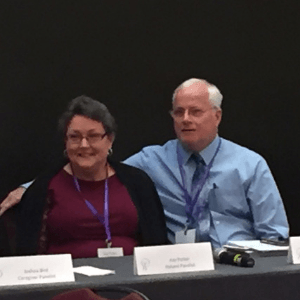
This is Kay and John Potter. Kay was diagnosed with a glioblastoma in February 2018. Read our interview with Kay and John, and learn how faith remains a strong pillar in healing and helping others with a brain tumor.
How were you impacted by a brain tumor diagnosis?
Kay Potter (KP): I’ve never been sick, so it was a huge adjustment for me to deal with the constant fatigue and general “sick” feeling. I had read all about the normal reaction to radiation and chemotherapy, but you just can’t prepare yourself for the drastic changes. My taste buds changed, so nothing tasted the same. I lost the hair on one side of my head, where the tumor was and the radiation was attacking what was left. I felt like I needed to pace myself and rest as much as possible.
John Potter (JP): As soon as it was confirmed that Kay had brain cancer, my purpose in life was to find the best place for Kay to get treatment and to help her get through this process with as little discomfort as possible. I wanted to keep our lives “normal,” and help our kids and grandkids understand what Kay is going through. My goal was to try to help them stay positive in a difficult situation and helping Kay beat this.
How has faith helped you in your brain tumor journey?
JP: Because of our faith in God, we knew that Kay and I were destined for this. We don’t know the outcome, but we are trying to stay positive, because God promises to never allow us to be dealt things we cannot handle.
It’s not easy, and we still worry, but for the most part, we know this is right where God wants us. At this point for me, it’s all about helping Kay, then helping others that God brings into our lives. In fact, we are mentoring a woman about five or six months behind us in this process.
How have you helped others along a similar journey?
KP: Our mentee was in the same clinical trial as I was, and it’s been a joy to walk her through this uncertain process and hopefully give her hope and encouragement. We were also asked to participate in the patient/caregiver panel at the ABTA Regional Meeting, because of our perspective that faith can help heal. We felt it was our responsibility to attend and share our experiences.
The sister of our mentee attended the ABTA Regional Meeting as well, and we spent the remainder of the day with her. We first met her at our mutual treatment center the day they were starting our mentee’s clinical trial. We tried to give her some ideas, and we introduced her to our hospital’s social worker for extra support.
What have you found invaluable in partnering with the ABTA?
JP: I really had a great time at the Tampa Regional Meeting. We also found information in the different sessions helpful, and we were excited to learn more about glioblastoma and what the future holds in treatment. It also was good to meet others who were dealing with this disease and share mutual experiences. We met a young woman whose husband was just starting this journey. It was good to speak with her, and try to encourage and give her some ideas of what’s to come.
I also enjoyed the tumor board session and being able to see how our doctors take care of their patients through various treatment approaches. Two members of our care team from Motiff Cancer Center, Dr. Liu (our surgeon) and Dr. Forsyth (our neuro-oncologist), both presented at the tumor board session. It was a pleasure to see them at work.
KP: I agree – I also learned so much about all aspects of the disease, from the medical to the psychological aspects of dealing with glioblastoma.
JP: For us, the most impactful session was about the future of treating glioblastoma, presented by our surgeon, Dr. Liu. Kay has completed the standard of care, which includes surgery, radiation, and chemotherapy. She will be finishing up her clinical trial in the next few months. Because things are going so well, we are starting to talk with Dr. Forsyth, our neuro-oncologist and others about what to do next. So, what’s coming down the pike is very important to us.
Read about the 2019 Regional Meetings.
Learn more about the ABTA’s support resources and brain tumor education.
